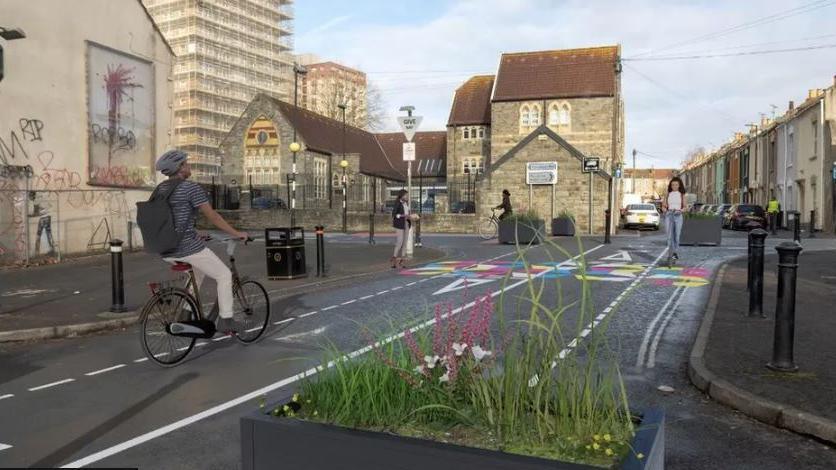Vehicle bans 'just scratch the surface' says green campaigner

The scheme in Barton Hill and St George aims to reduce rat-running and through-traffic, making it easier and safer to walk and cycle
- Published
A transport expert says closing off some of Bristol's roads to vehicles is "just scratching the surface."
Bollards and planters will be placed on roads in Barton Hill and St George as part of a trial by Bristol City Council.
Green campaigner and transport planner at climate charity Possible, Rob Bryher, said plans for a new Liveable Neighbourhood in east Bristol were "minuscule" compared to what the city needs.
While Mr Bryher said most people would welcome the changes after a few months, some residents have expressed concerns the restrictions will cause congested roads elsewhere.
'Belligerent attitude'
The trial is aiming to reduce rat-running and through-traffic, making it easier and safer to walk and cycle.
Mr Bryher said vehicles going through the centre of residential communities is "community severance."
"The more traffic that there is on the road, the less you talk to your neighbours, the less children play on the street, the less it feels safe," he added.
According to the Local Democracy Reporting Service, earlier in July, around 200 local residents discussed the concerns for the scheme at a public meeting organised by Keep Bristol Moving, a new campaign set up to oppose the council’s plans.
Attendees raised a wide variety of concerns, including a lack of public consultation, negative impacts on local businesses, and delays to emergency services.
However, Mr Bryher said those opposing the scheme are "an anti-clean air, anti-children’s safety and anti-cycling," and have a "very belligerent attitude" towards any kind of change.
Car ownership 'outdated'
"It’s just scratching the surface of what we have to do to reimagine our cities without cars," he added.
Mr Bryher said he understands some people need a car, including those with disabilities and people "who have a trade" but removing vehicles from the city's roads would allow them to "be able to get to where they’re going quicker."
“The notion that we all have to have a car is just outdated," he said.
"Public transport is unreliable and overpriced, but it’s never going to get better if there’s loads of cars in the way. We’re just using the carrot and not the stick.”
Mr Bryher said drivers struggling to find new routes through the area may be a potential problem, but his "biggest" concern is the roll-out of the scheme's trial, which was pushed back from the autumn to winter, being delayed.
The council recently promised a new round of public consultation before any bollards or planters are installed on the roads.